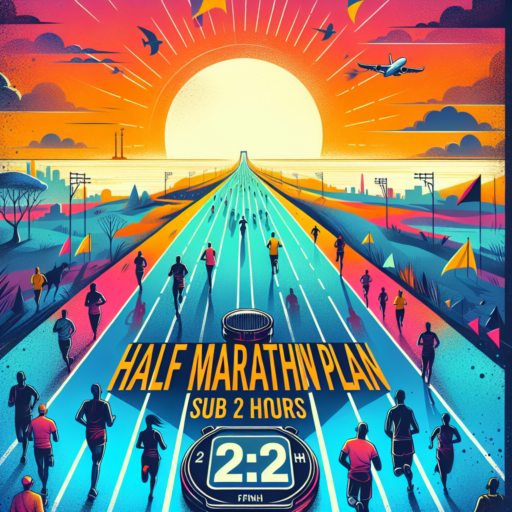Introduction to Coros Half Marathon Training Plan
Embarking on a half marathon journey challenges both your mind and body, requiring a blend of dedication, resilience, and strategic preparation. The Coros Half Marathon Training Plan stands as a meticulously crafted blueprint, designed to guide beginners and seasoned runners alike towards conquering 13.1 miles with confidence. This introductory overview sheds light on what makes the Coros approach uniquely effective, integrating cutting-edge technology with proven training principles.
At its core, the Coros Half Marathon Training Plan is built upon a foundation of progressive overload, ensuring that runners incrementally increase their mileage and intensity in a way that’s sustainable and injury-preventing. Further, it emphasizes the critical importance of recovery and rest days, acknowledging these are just as paramount as the runs themselves. By marrying these elements with the precision of modern wearable technology, Coros offers an unprecedented level of personalized training guidance.
Moreover, versatility is a hallmark of the Coros plan. Whether you’re eyeing your first-ever half marathon or aiming to set a new personal best, the plan adapts to meet your specific goals and current fitness level. It incorporates a variety of workouts – from easy runs to tempo runs, long runs, and even cross-training sessions – to ensure a comprehensive development of endurance, speed, and strength. Highlighting the integration of feedback from industry experts and elite athletes, the Coros approach is both holistic and dynamic, evolving with the latest in sports science research.
Understanding the Basics of the Coros Half Marathon Training Schedule
Embarking on a half marathon journey with the Coros Half Marathon Training Schedule means understanding its fundamental structure and philosophy. This training regimen is designed for runners of various levels, emphasizing gradual progression, injury prevention, and balanced training. Its hallmark is the integration of technology and personalized metrics to customize your running experience.
Key Components of the Coros Schedule
The Coros training plan incorporates several key components to ensure comprehensive preparation for your half marathon. First, it allocates specific days for long runs, essential for building endurance. To complement these, speed workouts and tempo runs are interspersed throughout the week to enhance your aerobic capacity and running economy. Also, importance is given to rest days and cross-training, which are crucial for recovery and injury prevention. By following these components, runners can optimize their performance and achieve their goals.
Personalization and Adaptation
One of the Coros Half Marathon Training Schedule’s strengths lies in its adaptability to the individual runner. Through the use of Coros wearables and the accompanying app, runners can track their progress, monitor their heart rate, analyze sleep patterns, and more. This data allows the schedule to be adjusted in real-time based on the runner’s performance, fatigue levels, and overall well-being. Such personalization helps in crafting a training plan that not only aims for peak performance on race day but also maintains the runner’s health and motivation throughout the training period.
In sum, the Coros Half Marathon Training Schedule offers a comprehensive approach that balances physical training with technology-driven personalization. Whether you’re a beginner aiming for your first half marathon or an experienced runner looking to set a new personal best, understanding and utilizing the basics of this plan can set you on the path to success.
How to Personalize Your Coros Half Marathon Training for Optimal Results
Personalizing your Coros half marathon training can significantly enhance your performance and enjoyment of the event. Understanding your unique physical capabilities, setting realistic goals, and incorporating technology and data can tailor your preparation for optimal results. This approach ensures your training is aligned with your personal health, fitness level, and marathon aspirations.
Identify Your Baseline with Coros Technology
Begin by assessing your current fitness level using the advanced metrics provided by Coros wearables. Track your heart rate, pace, and recovery times to establish a clear training baseline. This data allows you to custom-design a training plan that challenges you without risking overexertion or injury. Monitoring your progress through Coros technology not only motivates but also provides tangible evidence of your advancement.
Customize Your Training Plan
With your baseline established, tailor your training schedule to address your specific needs. If endurance is your goal, focus on gradually increasing your long-distance runs. Should speed be a priority, incorporate interval training and tempo runs into your regimen. Remember to include rest days and cross-training to prevent burnout and improve overall fitness. Listening to your body and adjusting your plan according to how you feel is paramount for a personalized training journey.
Adapting your training for a Coros half marathon involves more than just running; it’s about crafting a personalized experience that caters to your personal fitness journey. By leveraging Coros’s technology to gain insights into your performance and fine-tuning your training plan accordingly, you’re setting the stage for a successful and enjoyable marathon experience.
Week-by-Week Breakdown: Following the Coros Half Marathon Plan
Embarking on a half marathon journey requires discipline, commitment, and a solid training plan. The Coros Half Marathon Plan stands out for its comprehensive approach, offering a week-by-week breakdown that tailors to every level of runner. This plan uniquely combines endurance runs, speed work, and recovery periods, ensuring a gradual build-up towards race day.
The initial weeks focus on establishing a running baseline, gradually increasing mileage while incorporating essential rest days. As participants progress through the Coros Half Marathon Plan, they’ll notice an emphasis on variety. Interval training and tempo runs become key components, designed to improve speed, efficiency, and cardiovascular strength. It’s this mix of workouts that prepares runners not just physically, but mentally for the challenges ahead.
Another significant aspect of the Coros Half Marathon Plan is the emphasis on recovery and injury prevention. Rest days are strategically placed to allow the body to recover, complemented by suggestions for cross-training to maintain fitness without overtaxing running muscles. By following this thorough week-by-week guide, runners can approach their half marathon goals with confidence, knowing they’ve trained in a balanced and effective manner.
Nutritional Guidelines to Complement Your Coros Half Marathon Training
Training for a Coros Half Marathon requires not just physical endurance and rigorous training schedules, but also a carefully curated nutritional plan to enhance performance and facilitate recovery. Understanding the fusion of proper nutrition with your training regimen is pivotal. The objective here is to focus on nutritional strategies that complement your effort, optimizing energy levels, muscle repair, and overall health as you prepare for the race.
Optimal Macronutrient Balance
Striking the right balance of carbohydrates, proteins, and fats is essential for marathon runners. Carbohydrates are your body’s primary fuel source during high-intensity training, making them crucial for maintaining stamina. Integrating complex carbohydrates such as whole grains, vegetables, and fruits into your diet ensures a steady energy supply. Proteins play a critical role in muscle repair and recovery. Incorporate lean sources like chicken, fish, and legumes. Fats, particularly unsaturated fats found in avocados, nuts, and seeds, are vital for long-term energy, crucial in long-distance running.
Hydration and Electrolyte Balance
Proper hydration is paramount in marathon training, influencing both performance and recovery. Runners should aim to stay adequately hydrated throughout the day, with an emphasis on days leading to and on the race day. While water is the primary source for hydration, incorporating electrolyte-enhanced beverages can prevent imbalances that lead to cramping and decreased performance. Monitoring the color of your urine serves as a practical guide to hydration levels; aim for a pale yellow color.
Nutrition Timing and Portion Control
The timing of your meals and snacks plays a significant role in optimizing training and recovery. A pre-run meal or snack should be rich in carbohydrates and easily digestible, consumed 1-2 hours before your run, providing the fuel necessary for endurance. Post-run meals should focus on protein and carbohydrates to aid in muscle recovery and glycogen replenishment. Practicing portion control can prevent overeating, which is common in high-volume training phases, potentially leading to weight gain instead of performance benefits.
Incorporating Cross-Training and Rest Days into Your Coros Schedule
Understanding the balance between training, cross-training, and rest is crucial for any athlete aiming to enhance their performance while using a Coros schedule. Cross-training not only diversifies your workout regimen but also reduces the risk of injury by not overusing the same muscle groups. By integrating different forms of exercise, such as swimming, cycling, or yoga, you can maintain or even improve your fitness level while giving your primary sport muscles a much-needed break.
Rest days are equally important in a well-rounded Coros schedule. These are the days when your body repairs itself, adapts to the stresses of training, and replenishes energy stores. A common misconception is that taking days off will hinder progress. However, incorporating strategic rest days not only prevents burnout but can actually lead to performance improvements. Listening to your body and including rest days is essential for long-term health and success in any physical endeavor.
When designing your Coros training plan, it’s critical to strike the right balance between activity and rest. Consider dedicating at least one to two days a week to cross-training activities that complement your main sport. This approach ensures you are engaging different muscle groups and improving your overall fitness without overstraining. Additionally, scheduling at least one full rest day weekly is vital to allow your body the time it needs to recover fully. This holistic approach to training can ultimately lead to better performance and reduced risk of injury.
Essential Gear and Technology for Your Coros Half Marathon Preparation
Preparing for a Coros half marathon requires not just determination and training but also the right gear and technology to enhance performance and ensure safety. From selecting the perfect running shoes to integrating cutting-edge gadgets, the choices you make can significantly impact your preparation and race day success.
Advanced Running Shoes
First and foremost, investing in a high-quality pair of running shoes is crucial. These shoes should offer ample support, cushioning, and be tailored to your stride to prevent injuries. Look for models with excellent reviews from long-distance runners and technologies such as energy return and shock absorption. Remember, the right shoes act as a foundation, significantly reducing the risk of discomfort and enhancing your running efficiency.
Wearable Technology
In today’s tech-savvy world, leveraging wearable technology can offer a substantial advantage. A Coros sports watch can track your pace, distance, heart rate, and more, providing real-time feedback to optimize your training sessions. Additionally, consider incorporating heart rate monitors and GPS devices to fine-tune your performance. These tools not only help in monitoring progress but also in planning effective training schedules that align with your half marathon goals.
Accompanied by the essential gear, such as breathable running apparel and hydration solutions, and the incorporation of smart technology, preparing for a Coros half marathon becomes a more manageable and precise endeavor. Focusing on these key elements ensures that you are well-equipped to tackle the challenges of half marathon training and ultimately achieve your personal best.
No se han encontrado productos.
Monitoring Progress and Updating Your Coros Training Plan
Regular monitoring and timely adjustments to your Coros training plan can significantly impact your fitness journey’s success. Understand the importance of paying attention to your body’s signals and the feedback from your Coros device. It’s not just about adhering strictly to a pre-defined schedule; it’s about adapting to the ongoing changes in your body’s condition and competencies.
To effectively monitor your progress, engage with the Coros app’s detailed analytics. Look for trends in your performance, such as improvements in your heart rate over time, pace consistency, and recovery rates. These metrics offer invaluable insights into how well your body is adapting to the training regimen. When certain thresholds are met or exceeded, it may be time to update your training plan to reflect your current fitness level and future goals.
Updating your training plan doesn’t necessarily mean increasing intensity or volume; sometimes, it means adjusting your recovery days or incorporating different types of workouts to address any plateauing in progress or to prevent overtraining. Listen to your body and consult with your Coros device to decide the best course of action. Adapting your plan based on accurate, real-time data ensures you’re always training efficiently and effectively.
Mental Preparation Strategies for the Half Marathon with Coros
Mental preparation is just as crucial as physical training when gearing up for a half marathon, particularly when aiming to utilize tools like the Coros watch to enhance performance. Developing a mindset conducive to high performance can significantly affect your race outcome. An essential strategy involves setting achievable, yet challenging goals for your race day facilitated by the robust data tracking and analysis provided by Coros devices.
Visualizing Success and Overcoming Obstacles
Visualization is a powerful technique in an athlete’s mental preparation arsenal. Imagining yourself crossing the finish line, keeping pace, or overcoming difficult segments of the race can bolster confidence and focus. Using Coros’s precise pacing data and course profiles, runners can craft detailed visualization strategies, picturing every stage with accuracy, thus bridacing the gap between mental rehearsals and actual performance.
Building a Positive Mental Attitude
A positive mental attitude can be the key differentiator on race day. Incorporating affirmations and positive self-talk based on performance data from your Coros watch can reinforce your belief in your training and your ability to execute your race plan successfully. Focusing on the progress tracked and highlighted by your Coros device, rather than being daunted by the enormity of the challenge ahead, can help maintain a positive mindset throughout your half marathon journey.
Remember, the journey to a half marathon is as much a mental challenge as it is a physical one. Integrating Coros’s advanced technological capabilities with mental preparation strategies can not only enhance your running experience but elevate your performance to new heights. Embrace these mental strategies to fully unlock your potential on race day.
Success Stories: Runners Who Thrived with the Coros Half Marathon Plan
Exploring the journeys of runners who found success with the Coros Half Marathon Plan, we uncover a multitude of tales of persistence, discipline, and breakthroughs. Each runner’s story is a testament to the effectiveness of the Coros training regime and the comprehensive support that accompanies it. From amateur runners to those with more experience on the track, the Coros Half Marathon Plan has played a pivotal role in transforming their running technique, endurance, and overall performance.
One remarkable narrative involves a runner who, prior to adopting the Coros Half Marathon Plan, had struggled to finish races within their target times. The structured yet flexible schedule, along with tailored training sessions, guided them not only to shaved minutes off their half marathon time but also instilled a renewed love for running. Consistency and smart training, as emphasized in the Coros plan, were key factors in their improvement.
Another success story comes from a runner battling injury setbacks. The Coros Half Marathon Plan, with its emphasis on recovery and cross-training, enabled them to return stronger, culminating in a personal best that had once seemed out of reach. This highlights the plan’s balanced approach, ensuring that runners stay healthy and injury-free while pushing their limits.




